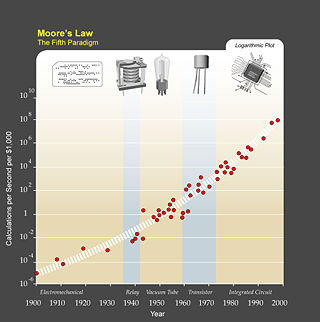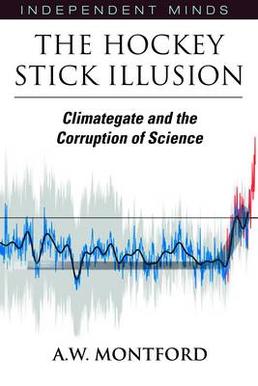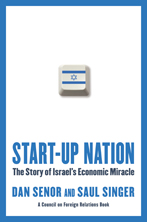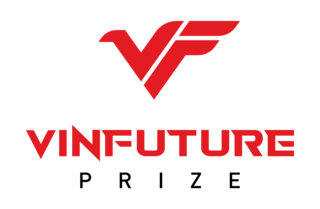
Sir Ridley Scott is an English film director and producer. He directs films in the science fiction, crime, and historical drama genres, with an atmospheric and highly concentrated visual style. He ranks among the highest-grossing directors, with his films grossing a cumulative $5 billion worldwide. He has received many accolades, including the BAFTA Fellowship for Lifetime Achievement in 2018, two Primetime Emmy Awards, and a Golden Globe Award. He was knighted by Queen Elizabeth II in 2003, and appointed a Knight Grand Cross by King Charles III in 2024.
The technological singularity—or simply the singularity—is a hypothetical future point in time at which technological growth becomes uncontrollable and irreversible, resulting in unforeseeable consequences for human civilization. According to the most popular version of the singularity hypothesis, I. J. Good's intelligence explosion model of 1965, an upgradable intelligent agent could eventually enter a positive feedback loop of self-improvement cycles, each successive; and more intelligent generation appearing more and more rapidly, causing a rapid increase ("explosion") in intelligence which would ultimately result in a powerful superintelligence, qualitatively far surpassing all human intelligence.

Matthew White Ridley, 5th Viscount Ridley,, is a British science writer, journalist and businessman. He is known for his writings on science, the environment, and economics, and has been a regular contributor to The Times newspaper. Ridley was chairman of the UK bank Northern Rock from 2004 to 2007, during which period it experienced the first run on a British bank in 130 years. He resigned, and the bank was bailed out by the UK government; this led to its nationalisation.

Peter H. Diamandis is an American marketer, engineer, physician, and entrepreneur. He is best known as the founder and chairman of the XPRIZE Foundation, and the cofounder and executive chairman of Singularity University. He is also cofounder and former CEO of the Zero Gravity Corporation, cofounder and vice chairman of Space Adventures Ltd., founder and chairman of the Rocket Racing League, cofounder of the International Space University, cofounder of Planetary Resources, cofounder of Celularity, founder of Students for the Exploration and Development of Space, and vice chairman and cofounder of Human Longevity, Inc.

Futures studies, futures research, futurism research, futurism, or futurology is the systematic, interdisciplinary and holistic study of social/technological advancement, and other environmental trends; often for the purpose of exploring how people will live and work in the future. Predictive techniques, such as forecasting, can be applied, but contemporary futures studies scholars emphasize the importance of systematically exploring alternatives. In general, it can be considered as a branch of the social sciences and an extension to the field of history. Futures studies seeks to understand what is likely to continue and what could plausibly change. Part of the discipline thus seeks a systematic and pattern-based understanding of past and present, and to explore the possibility of future events and trends.

Post-scarcity is a theoretical economic situation in which most goods can be produced in great abundance with minimal human labor, so that they become available to all very cheaply or even freely.

Philip Kotler is an American marketing author, consultant, and professor emeritus; the S. C. Johnson & Son Distinguished Professor of International Marketing at the Kellogg School of Management at Northwestern University (1962–2018). He is known for popularizing the definition of marketing mix. He is the author of over 80 books, including Marketing Management, Principles of Marketing, Kotler on Marketing, Marketing Insights from A to Z, Marketing 4.0, Marketing Places, Marketing of Nations, Chaotics, Market Your Way to Growth, Winning Global Markets, Strategic Marketing for Health Care Organizations, Social Marketing, Social Media Marketing, My Adventures in Marketing, Up and Out of Poverty, and Winning at Innovation. Kotler describes strategic marketing as serving as "the link between society's needs and its pattern of industrial response."

The Hockey Stick Illusion: Climategate and the Corruption of Science is a book written by Andrew Montford and published by Stacey International in 2010, which promotes climate change denial.

Start-up Nation: The Story of Israel's Economic Miracle is a 2009 book by Dan Senor and Saul Singer about the economy of Israel. It examines how Israel was able to reach such economic growth that "at the start of 2009, some 63 Israeli companies were listed on the NASDAQ, more than those of any other foreign country."

Next What's In is a management and self-help book that introduces "Dissolve the box" as an idea, strategy and way of life. It was written by Santosh Sharma and was published by CAS Research Wing in 2010.

That Used to be Us: How America Fell Behind in the World It Invented and How We Can Come Back is a nonfiction book written by Thomas Friedman, a Pulitzer Prize-winning New York Times columnist and author, with Michael Mandelbaum, a writer and foreign policy professor at Johns Hopkins University. They published the book on September 5, 2011, in the United States. It addresses what the authors see as the four major problems America faces today, and possible solutions. These problems are defined as: globalization, the revolution in information technology, the nation's chronic deficits, and its pattern of energy consumption.

The Great Stagnation: How America Ate All the Low-Hanging Fruit of Modern History, Got Sick, and Will (Eventually) Feel Better is a pamphlet by Tyler Cowen published in 2011. It argues that the American economy has reached a historical technological plateau and the factors that drove economic growth for most of America's history are no longer present. These figurative "low-hanging fruit" include the cultivation of much free, previously unused land, technological breakthroughs in transport, refrigeration, electricity, mass communications, sanitation, and the growth of education. Cowen, a professor of economics at George Mason University, theorizes that these factors have contributed to stagnation in the median American wage since 1973.
Steven Kotler is an American author, journalist and entrepreneur. He is best known for his nonfiction books, including Abundance, A Small Furry Prayer, West of Jesus, Bold, The Rise of Superman and Stealing Fire.
Ted Nordhaus is an American author and the director of research at The Breakthrough Institute. He has co-edited and written a number of books, including Break Through: From the Death of Environmentalism to the Politics of Possibility (2007) and An Ecomodernist Manifesto (2015) with collaborator Michael Shellenberger.

Googled: The End of the World as We Know It is a book published in 2009 by American writer, journalist and media critic Ken Auletta. It examines the evolution of Google as a company, its philosophy, business ethics, future plans and impact on society, the world of business and the Internet.

The Rational Optimist is a 2010 popular science book by Matt Ridley, author of The Red Queen: Sex and the Evolution of Human Nature. The book primarily focuses on the benefits of the innate human tendency to trade goods and services. Ridley argues that this trait, together with the specialization linked to it, is the source of modern human civilization, and that, as people increasingly specialize in their skill sets, we will have increased trade and more prosperity.

Tomorrowland: Our Journey from Science Fiction to Science Fact is a 2015 nonfiction book by science journalist Steven Kotler and published by Amazon Publishing.

Robots Will Steal Your Job, but That's OK: How to Survive the Economic Collapse and Be Happy is a book by Federico Pistono that was published in 2012. Initially self-published by the author, it was later picked up by publishers internationally and translated in six languages. It became a best-seller on Amazon.com, and was covered in various publications such as the BBC, the Financial Times and Época.

The VinFuture Prize is an annual international award that honors remarkable scientific breakthroughs and promotes innovations for mankind, with involvement from scientists, policymakers, business leaders, and prize holders.
















